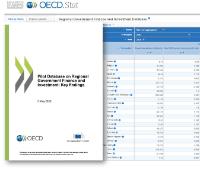Regional Development
Multi-level Governance & Decentralisation
|
Why multi-level governance is important |
|
|
In the context of growing regional inequality, the advent of megatrends, and the "geography of discontent", governments at all levels must work in a strategic, collaborative and evidence-based fashion. To do so, robust multi-level governance arrangements among national, regional and local governments, as well as across jurisdictions, are called for. This can require adapting inter-governmental roles, relationships, and institutional frameworks to improve the quality of public services, the effectiveness of public investment and the sustainability of public finance. |
|
|
Projects & Publications |
|
|
Decentralisation Decentralisation is among the most important reforms of the past 50 years. The OECD defines decentralisation as measures that transfer a range of powers, responsibilities and resources from central government to subnational governments, defined as legal entities elected by universal suffrage and having some degree of autonomy. Decentralisation outcomes – in terms of democracy, efficiency, accountability, regional and local development – depend greatly on the way decentralisation is designed and implemented.
|
 |
|
Regionalisation: Reform and Governance Regionalisation is an increasing trend in the EU and OECD. It is associated with the need to coordinate place-based policies adapted to the specific conditions of regions and to generate economies of scale in the provision of public services. We support countries to design and implement regional reforms and enhance governance at the regional level.
|
 |
| Multi-level Governance Reform: Overview of OECD Country Experiences |  |
|
This report provides an overview of “multi-level governance” reforms in OECD countries. It looks at institutional reforms, which reorganise powers, responsibilities and resources across levels of government, as well as territorial reforms, which address territorial structures, often modifying regional and local government administrative areas. It describes the rationale for different reforms, their characteristics and outcomes, as well as the obstacles faced by governments in designing and implementing them. The report includes five case studies that take an in-depth look at countries that have undertaken considerable multi-level governance reforms: Finland, France, Italy, Japan and New Zealand. |
|
|
Country reviews for decentralisation and regionalisation |
|
|
Related topics |
|
|
Public investment and regional development Subnational public finance |
|
Back to the main page of multi-level governance
Related Documents
